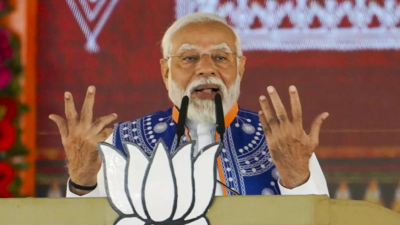NEW DELHI: Calling ‘Maha Kumbh’ a celebration of “unity in diversity”, PM Narendra Modi on Sunday said the festival being a “confluence of equality and harmony” tells how the traditions bind the whole of India together, and cited several other examples of similar religious festivals along the banks of different rivers across the country.
‘Maha Kumbh’ is under way at ‘Sangam’ — confluence of the Ganga, Yamuna and the mythical Saraswati — in UP’s Prayagraj.
“People from all over India and the world congregate on the sands of the Sangam. There is no discrimination, no casteism anywhere in this tradition which has been going on for thousands of years… In the Kumbh, the rich and the poor come together as one. All of them take a dip at the Sangam, dine together in the ‘bhandaras’, receive ‘prasad’ that is why the Kumbh is the Maha Kumbh of unity,” said Modi in his monthly radio programme ‘Mann Ki Baat’ — the first for this year.
He narrated how the ways of “adhering to the beliefs are the same” from north to south, and cited examples of ‘Kumbh’ being organised at Prayagraj, Ujjain, Nasik and Haridwar in the north, and ‘Pushkaram’ on the banks of Godavari, Krishna, Narmada and Kaveri rivers in the south.
“Both these festivals are connected with our holy rivers and their beliefs. Similarly, from Kumbakonam to Tirukkad-Yur, from Kood-Vasal to Tirucherai, there are many such temples whose traditions are connected with Kumbh,” he said.
Referring to the ‘Ganga Sagar Mela’, organised in West Bengal, he said, “On the auspicious occasion of Sankranti, lakhs of devotees from all over the world took a dip at this fair. ‘Kumbh’, ‘Pushkaram’ and ‘Ganga Sagar Mela’ — these festivals of ours are festivals that enhance our social coalescence, harmony, unity.”
He also lauded efforts of Indian scientists for their achievements and specifically mentioned their success in undertaking space docking of satellites that made India the fourth country to have achieved this success.
Modi said scientists are making efforts to grow plants in space. “For this, ISRO scientists chose cow pea seeds. These, sent on Dec 30, germinated in space. This is a very inspiring experiment which will pave the way for growing vegetables in space in the future,” he said.




